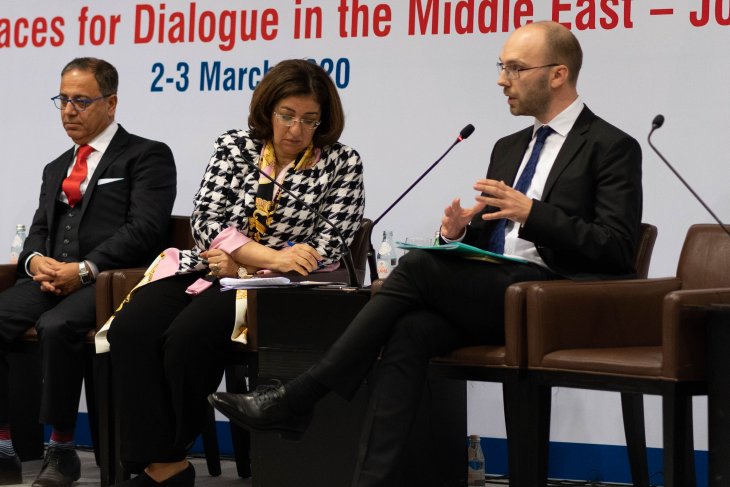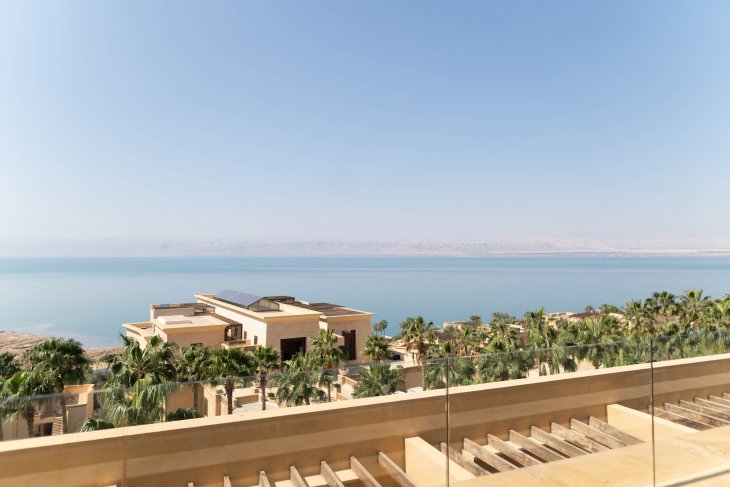On March 3 the PRIO-CSS Jordan seminar, “Preserving Spaces for Dialogue in the Middle East”, was situated by the shore of the Dead Sea. The view was both beautiful and thematically fitting, because while most people associate the Dead Sea with a rather exotic seaside tourist destination, and the Kingdom of Jordan with being a peaceful hub in a turbulent region, this exact location allowed us to reflect on the fact that this has not always been true. Peace, like war, is made, and we can learn several lessons from the past. Reflecting on the precise conference site, as the historian on the panel, I therefore asked that we take some steps back in time.

From left: Dr. Zaid Eyadat, Director, CSS, H.E. Reem Abu Hassan, Former Minister for Social Development in Jordan, Dr. Jørgen Jensehaugen. Photo: Indigo Trigg-Hauger/PRIO
Three wars in two decades
In 1948, just on the other side of the Dead Sea, the newly founded state of Israel was at war with all its Arab neighbors and the Palestinian population. This war led to 750,000 Palestinians becoming refugees, a large portion of them settling in Jordan. Between 1949 and 1967 the territory across the lake, the West Bank, was in fact Jordanian territory. In 1967 this territory was occupied by Israel during the six-day war. In other words, in two instances in the middle of the last century one could see a dramatic regional war unfolding from just across the lake. Then, in 1970 there was a civil war in Jordan which involved, in addition to the Jordanian army and the PLO forces, also regional actors such as Syrian troops and the overhanging threat of Iraqi or Israeli intervention.
In 1994 Jordan signed its peace treaty with Israel. Jordan was the second Arab state to do so, after Egypt signed its peace treaty in 1979. The efficiency of the peace negotiations between Jordan and Israel could be credited to two things: First, the PLO had signed the Oslo treaty in 1993, making this a regionally favorable time as the main opposition to signing treaties with Israel was gone. For decades the PLO had demanded that the West Bank was supposed to be a future Palestinian state, while Jordan had insisted – until 1988 – that the West Bank should be returned to Jordan. While this Palestinian-Jordanian disagreement ended in 1988 there was still serious opposition against signing a peace treaty with Israel because of Israel’s occupation of the Palestinian territories. While the Oslo-treaty did not end the occupation, it did include a PLO recognition of Israel. Once that had happened the PLO could no longer argue that it rejected Arab states’ right to negotiate with Israel. Secondly, Jordanian monarchs had held secret talks with Israeli officials since the 1940s. This was the case both with King Abdullah I and King Hussein. Until the time was ripe, however, these talks could not result in anything concrete.

The view over the Dead Sea toward the West Bank. Photo: Indigo Trigg-Hauger/PRIO
Peace and war are regional
The two above-mentioned factors make it clear that local, or bilateral peace, is tied to regional dynamics in the same way that war is. If the regional situation is one of high levels of competition and animosity, then the situation is not conducive to peace. When, on the other hand, the regional situation is stable and in a problem-solving mode, the situation is conducive to making peace.
Additionally, maintaining lines of dialogue is important. While such behind the scenes dialogue might be unpopular and might seem to give no results at the time, or even guarantee that they will lead to success at any point in time, they are valuable precisely because if the situation were to change then the existence of such channels in the past can be reopened to facilitate peace negotiations.
Taken for granted
The most important takeaway I hoped to convey is that external actors should not take countries like Jordan for granted. There are two clear examples of this in recent history:
In 1978 Jordan was, together with Egypt, the most moderate of the so-called confrontation states. When the US negotiated the Camp David Accords Egypt, Israel and the US all took Jordan for granted, including them in the text of the Camp David Accords without asking for King Hussein’s opinion, excluding him from the process. There was simply no way Jordan could accept an agreement which was based on their exclusion. The result was that there was far less regional support for the Camp David Accords, meaning that it was practically impossible to broaden them to deal with issues beyond Egypt and Israel.
In 2020, similarly, when President Donald Trump launched his “deal of the century” Jordan was given a central role, particularly in Jerusalem, without being included in the actual political process. Jordan was not the only party to be excluded, and the Jordanian exclusion is only one of many problems with this proposal. However, their omission goes to the core of my point: so-called local conflicts always have regional repercussions.
Including regional actors not just in name, but also in process and in substance, is central.
The lesson I hope our seminar attendees walked away with is that while peace is made between parties in the region, external actors should seek to foster inclusive dialogue even at times when the region is not conducive to peacemaking.